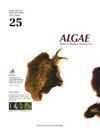西北太平洋丝状葡萄藤科植物(Halymeniales,Rhodophyta)的物种鉴定和分布
IF 2.4
3区 生物学
Q1 MARINE & FRESHWATER BIOLOGY
引用次数: 0
摘要
准确识别物种是所有生物学研究的基础。在鉴别有细羽状毛形态类似于Grateloupia filicina(该科的模式种)的Grateloupiacean种时,存在很多混淆。本研究的目的是基于rbcL序列,全面探讨西北太平洋地区菲利辛纳类物种的种类鉴定和分布。2001 ~ 2021年在韩国和日本的78个地点采集了118份标本,分析了rbcL序列。从GenBank下载的另外341个序列被纳入我们的综合数据集。在此基础上,记录了该物种的命名历史和地理分布,并对物种名称的应用进行了评述。asiatica是西北太平洋地区最丰富的丝状亚种,其形态变异程度高,造成了许多误认。特别是,需要使用更多来自中国的标本,重新考虑它们与亚洲巨齿弓形虫的同一性。相比之下,G. oligoclora被认为是G. subpectinata的异型同义词。在韩国,由于与其他物种的误认,出现了尖锐革螨、毛毛革螨和livida革螨。本文章由计算机程序翻译,如有差异,请以英文原文为准。
Insight into the species identification and distribution of Grateloupiaceae (Halymeniales, Rhodophyta) having Grateloupia filicina-like morphology in the Northwest Pacific
Accurately identifying species is the basis of all biological studies. There has been much confusion in the identification of Grateloupiacean species, which have finely pinnate gross morphology similar to Grateloupia filicina (the type species of the family). The objective of this study was to comprehensively investigate species identification and distribution of G. filicina-like species in the Northwest Pacific, based on the rbcL sequences. A total of 118 specimens from 78 sites in Korea and Japan were collected from 2001 to 2021 and analyzed for their rbcL sequences. Additional 341 sequences downloaded from the GenBank were included in our comprehensive dataset. Based on these sequences, we documented the nomenclatural history and geographical distribution of the species, and commented on the application of species name. G. asiatica was the most abundant G. filicina-like species in the Northwest Pacific, and its high degree of morphological variation caused many misidentifications. In particular, G. dalianensis, G. serra and G. variata require reconsideration of their conspecificity with G. asiatica using more specimens from China. By contrast, G. oligoclora was presumed to be a heterotypic synonym of G. subpectinata. The occurrence of G. acuminata, G. ramosissima, and G. livida in Korea resulted from misidentifications with other species.
求助全文
通过发布文献求助,成功后即可免费获取论文全文。
去求助
来源期刊

Algae
PLANT SCIENCES-
CiteScore
5.10
自引率
25.00%
发文量
18
期刊介绍:
ALGAE is published by the Korean Society of Phycology and provides prompt publication of original works on phycology. ALGAE publishes articles on all aspects of phylogenetics and taxonomy, ecology and population biology, physiology and biochemistry, cell and molecular biology, and biotechnology and applied phycology. Checklists or equivalent manu-scripts may be considered for publication only if they contribute original information on taxonomy (e.g., new combinations), ecology or biogeography of more than just local relevance. Contributions may take the form of Original Research Articles, Research Notes, Review Articles and Book Reviews.
 求助内容:
求助内容: 应助结果提醒方式:
应助结果提醒方式:


